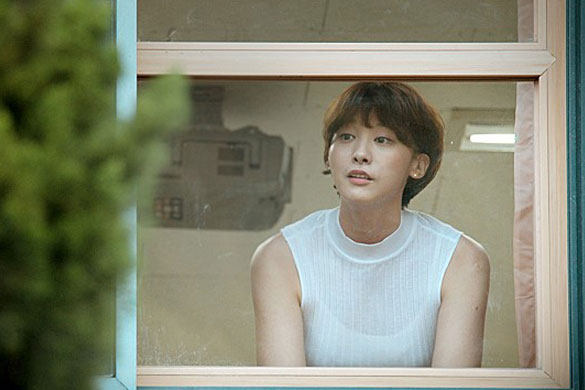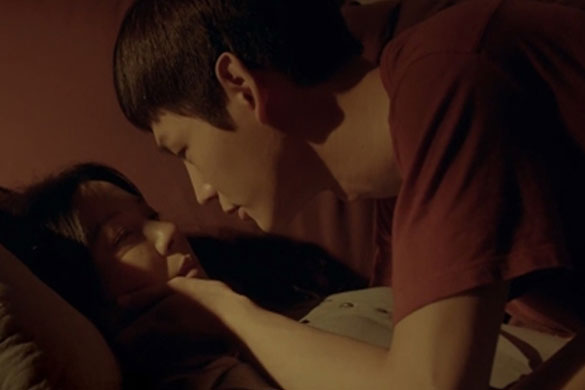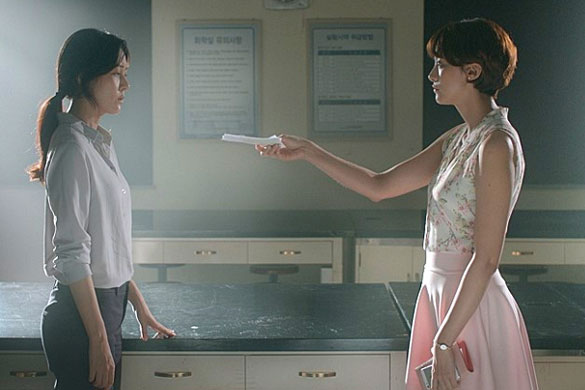
 |
||||
Hyo-joo (Kim Ha-neul) is a chemistry teacher at an all boys school where she’s hoping to get a tenured position when her current contract runs out at the end of the year. Trying to further boost her chances of continued and permanent employment, she agrees to take on the home-room responsibilities of a colleague on maternity leave, coming into contact for the first time with student Jae-ha (Lee Won-keun) whose prowess in classical dance instantly intrigues her.
Review: Sexually-infused narratives in Korean cinema have long been peppered with depictions of relationships historically deemed inappropriate by traditionalism. Whether focusing on simply adulterous affairs (April Snow); same-sex lustful need and indulgence (Yellow Hair); sadomasochism (Lies); an older woman’s sexual desire for a much younger male (Green Chair) or vice versa (Eungyo); or even more specifically a teacher’s carnal entanglement with a student in their care (Innocent Thing), such long-time, societally frowned upon (and as a result taboo) sexual encounters – whether repeated or indeed singular – almost always form the basis for cautionary tales requiring an ultimate price to be paid for carnal gratification. With Korea historically being a wholly patriarchal society, for decades since the very earliest years of Korean cinema that price – whether family ruining, life decimating or indeed life ending – was demanded of women first and foremost and in fact the first ever Korean film that didn’t ultimately punish a sexually voracious woman for her wanton actions was The Adventures of Mrs. Park which wasn’t released until 1996.
The majority of Misbehaviour is presented more as dark drama than thriller per se, as much an in-depth, increasingly visceral character study of Hyo-joo as it is a building narrative. Early in proceedings, Hyo-joo is described by colleagues as friendly and helpful but it quickly becomes clear that that is a mask for show that allows her to keep those around her at arm’s length. For here we have a woman forced to watch (and grudgingly accept) life incrementally stripping away anything of meaning – her prospects of continuing employment looking increasingly precarious; her useless writer boyfriend expecting her to provide for and indeed virtually serve him while giving nothing in return and in fact walking out on her when she tries to take a stand; etc. With the arrival of Hye-young at the school in the tenured position Hyo-joo desperately yearns she sees the personification of everything she wants but doesn’t have, her jealousy of Hye-young's privileged and seemingly easy life instantly driving her to absolute hatred, almost laying the entire blame for everything that’s wrong in her life at the young woman’s feet. As such, when she catches Hye-young having sex with Jae-ha it is, from her point of view, the final straw pushing her to the belief that retribution is not only justified by also entirely necessary. Director Kim Tae-yong (who also wrote Misbehaviour’s script) deftly contrasts the increasingly cold, aggressively negative attitude of Hyo-joo towards Hye-young with the latter’s bouncy, ever-bubbly smiling countenance to ensure that though we can easily understand and even relate to what Hyo-joo is going through we begin to see her frankly nasty interactions and cutting statements as rather mean-spirited, even if we do have the suspicion that Hye-young's overt niceties are likely forced and fake. As such, for a time at least, our sympathies veer more towards Hye-young but as her actions gradually allow us to peek beneath her veil, if you will, it becomes blatantly apparent that she is every bit as manipulative, cold and power hungry as her soon-to-be enemy, once more allowing us to start to see Hyo-joo as the victim of the piece even if she’s guilty of bringing some of the angst and adversity she faces on herself.Combine these ideas with the repeated narrative switching of hunter to hunted and vice versa, as it were, as the power play between the women ramps up and Misbehaviour’s true strengths cannot fail to be seen.
It could be said that no-one in a twisted love triangle such as this escapes entirely unscathed but Misbehaviour deftly shows that in this case each of those involved is ultimately as much a victim of themselves as of each other, even if one can be entirely blamed for the pain and (inappropriate relationship demanded) punishment of the other, adding a further thought-provoking layer to proceedings in the process.
MISBEHAVIOUR (여교사) / 2017
|
||||
All images © Filament Pictures, Finecut Review © Paul Quinn |
||||



